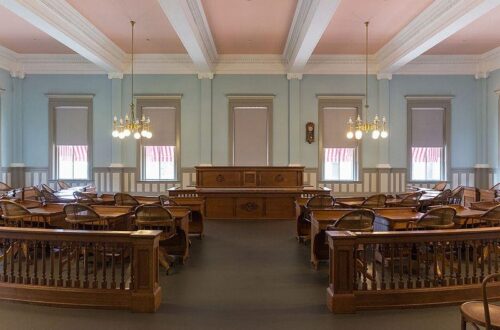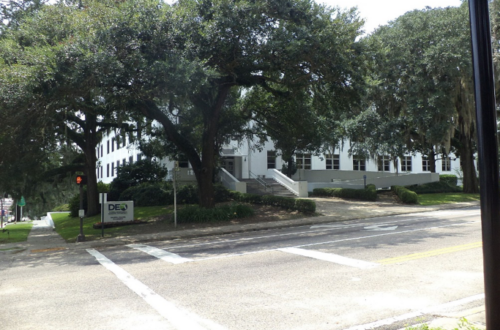Florida school board elections have become partisan battlegrounds with candidates wielding education as a new political weapon. Based on recent policies, Florida Republicans have doubled down on their family-oriented election campaigns by concentrating on education. This brings questions on what ideals and culture should be fostered in schools and how involved politics should be in education.
Florida public education became a hotly debated topic this election year with Florida Republicans, particularly Gov. Ron DeSantis, making it a major platform in their campaigns. The party is chiefly concerned with what they consider to be protecting parents’ rights and preventing what they call the “woke agenda” from infiltrating schools.
This idea of a woke agenda relates to curriculums such as Critical Race Theory and the open discussion of gender and sexuality. Florida Republicans are working towards carrying out their mission to prevent woke ideology from entering schools through a litany of political moves and policy. The most prominent examples are illustrated in the timeline below.
House Bill Seven, implemented April this year, is called the Stop Wrongs to Our Kids and Employees Act – nicknamed the Stop Woke Act. It successfully prevents any form of Critical Race Theory from manifesting in schools and bans the teaching of the existence of structural racism. The bill also concentrates on the prevention of certain beliefs or ideals relating to race, color, sex or national origin from being promoted in public schools.
The Stop Woke Act has created political turmoil particularly in Florida public universities, which have classes teaching concepts relating to race, color, sex and national origin encouraging individual thought and consideration of those topics.
House Bill 1557 added to the political discourse when its infamy or acclaim became a national topic. This bill, enacted March 2022, was labeled as the Parental Rights Measure but nicknamed the Don’t Say Gay Bill because of its provisions banning discussions on gender and sexuality to students in third grade and below. The bill also expanded parent’s involvement in their students’ education and more control in education regarding creating a more conservative or less liberal learning environment.
The use of masks in public schools throughout the pandemic is another recent issue that invited political discourse into education. When DeSantis began calling for school boards to lift mask mandates and school boards defied the Governor’s wishes, a partisan seed was planted into the politics of education.
DeSantis responded to this by signing an executive order in July 2021 banning schools from mandating masks, instead allowing parents to decide whether their student should wear a mask. In this way, he has continuously displayed his dedication to what he considers to be parental rights.
Florida’s public school system has become the center of a political tug-of-war between the left and right.
The current political climate in the Florida Senate and House allows partisan politics to reach school board elections connecting to local voters. The verbiage used by translating conservative views or mask usage into “parents’ rights” has allowed for Republicans to connect to voters who are parents by characterizing their children to be in danger of indoctrination by the left. The usually drowsy, local school board elections have become competitive partisan ground where connections and political allies have become crucial.
Since school board elections have become partisan, politicians have the opportunity to connect locally with voters by becoming involved heavily in education. DeSantis has capitalized on this opportunity by endorsing 29 school board candidates on Aug. 23. To gain his endorsement, school board candidates had to pledge to support his vision for Florida’s public schools.
His vision is outlined on his website where his team listed his primary education goals focused on parents’ rights and maintaining curriculum transparency. However, some of the points listed concentrate on preventing “indoctrination,” keeping “woke gender ideology out of schools” and the prevention of Critical Race Theory being applied, displaying threads of right ideologies and culture impacting their views on education. By gaining DeSantis’ endorsements, candidates also gained $1,000 in campaign funds giving them a financial edge over their competitors who had to scramble to find similar resources to support their campaigns.
In response to the Republican’s move of using school board elections, Democrats moved to dip into the world of school board politics. The Democratic party started to fund and back their own candidates to combat those DeSantis endorsed. Political committees on both sides of the partisan divide have been funneling more money than ever into school board elections, raising resources along with rising tensions. The impact of these rising tensions are yet to be discovered but there seems to be some success with the Desantis’ efforts as 19 out of 30 of his candidates have won their primary elections.
It has become clear that politics has and will impact education. This brings about questions if politics should be involved in education or if politics should even have a place in the discussion about education at all. Teachers have expressed their concerns on how these policies even benefit their students.
Paula Stephens, a first grade teacher in Pinellas County, questions the current policies.
“It just seems we are not focusing on what real needs are for our kids,” she said.
Questions involving how freedom of speech may be limited, and an encroachment on students’ and teachers’ rights to free speech are also concerns that may be raised as these policies are implemented in school districts.
Since the passing of the bill there have been four lawsuits against it concentrated on the application of this law in public universities. One lawsuit argues that the bill violates the First Amendment, protecting the freedom to speech, and the 14th Amendment, ensures equal protection under law. Another lawsuit hailing from a teacher and student from the University of South Florida claims the bill violates the First Amendment and a Florida law called the Campus Free Expression act.
Forcing education into the line of partisan crossfire might have major impacts on how future discussions on education are handled. The legal ramifications have become apparent with colleges resisting House Bill Seven through lawsuits, but there will also be vast impacts for all students in Florida. The students’ education is being shaped by the political disputes between the left and right.
By creating bills such as House Bill Seven and House Bill 1557, Republicans are liberating education from teachers’ control and allowing parents to shape education. The impact this will have on education over time is unknown. The matter will be decided by the responses from the government and courts. For now, DeSantis’ education era will continue to establish itself.
Check out other recent articles from the Florida Political Review here.
Featured image: Education in Florida has become the subject of new legislation and public debates. Unmodified photo by Brian Matis used under a Creative Commons license (https://bit.ly/3DqxKiF).





